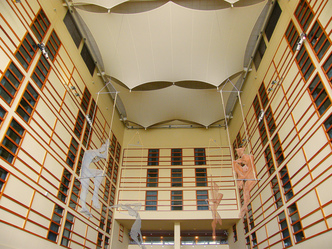| | than ever, today. The overall premise behind the howls, however, is not true. The private market always seems to respond to a shortage of downtown hotel rooms by building small hotels. In this case, a joint venture development is planning to build a 159-room extended-stay Hyatt House, with a parking garage and mixed-use retail. Later, the second phase of the project is planned as a 175-room select-service Courtyard by Marriott. The hotels will be right next to the EnergySolutions Arena, and the parking garage is planned to accommodate patrons of the arena and the Convention Center. But the combined 334 rooms fall well short of the 1,000-room convention center hotel various officials say is needed if the city is to compete with Denver, Phoenix or other similarly sized cities for conventions. The Legislature this year considered, then defeated, a measure that would have spent about $100 million in taxpayer funds to build a bigger hotel. That was a good decision. Here’s why: The market builds smaller hotels because that is the size the market can bear while still turning a profit. Without taxpayer subsidies, you can’t make the pro forma work for a convention center hotel, here or anywhere else. And if you do give millions of tax dollars to such a project, you automatically start out at an economic-benefit deficit the convention business won’t recover for awhile. Public officials always act as if it is self-evident that large conventions bolster the economy and enhance a city’s imagine, and that Salt Lake, despite its clean-cut image, would automatically compete with other cities for big conventions if it just had a larger hotel. As an economist with the University of South Florida told the Wall Street Journal last year, convention advocates will present studies on the impacts of a convention, but “Impact analysis adds and multiplies, but never subtracts and divides.” He was speaking about the impacts of a large political convention, but the basic principles remain the same for all conventions. Not insignificantly, however, Salt Lake City was a finalist for last year’s GOP nominating convention, even without a large convention hotel. It didn’t lose out to Tampa because of that hotel. The decision likely had more to do with the party’s nominee, Mitt Romney, not wanting too strong a tie to his religion during his hour in the spotlight. That religion and the city’s reputation as a tepid nightlife place, deserved or not, would continue to keep some conventions away regardless of a huge hotel. But there are more reasons not to worry about the lack of a hotel. This study by The Brookings Institution, published in 2005, says the convention marketplace is in decline nationwide, and that increased business is unlikely for any city. “Faced with increased competition, many cities spend more money on additional convention amenities, like publicly financed hotels to serve as convention ‘headquarters,’” its executive summary says. Also, trade show discounts are common, and many convention centers operate at a loss. If 2005 is too long ago for you, this more recent (March 2013) opinion piece by the Convention Industry Council suggests hard times are coming because of the sequester, continuing slow economic growth and the desire for companies to cut budgets. “Soon, companies may feel pressure, or a desire, to opt out of face-to-face meetings in favor of virtual events or no meetings at all,” the piece said. Although the piece argues for the meetings industry to get stronger, it is clear about the challenges. “As meeting professionals, we will be called on more and more to not only justify our services, but to do more with a lot less. Our challenge, therefore, is to be flexible and swift enough to adapt to what may become a hostile environment, driven by volatile global economic conditions, and provide the knowledge and leadership to guide this industry, and those who depend on it, into the future.” Large conventions may avoid Salt Lake City because they don’t want delegates to be shuttled around to several different hotels. However, the city boasts one of the best mass transit systems in the country, which is free downtown. Such a system arguably is better for the city, as delegates get out more and aren’t cooped up in one hotel for their entire stay (as I have been at some journalism conventions). Regardless, this doesn’t seem like the time to be investing in a convention hotel. Contrary to claims, the idea that such a hotel would bring in lots of new business is speculative, at best. |
|
1 Comment
9/1/2013 10:09:50 pm
Amazing! I love the architecture of the hotel building. Please share more posts to elaborate the topic. Thanks.
Reply
Your comment will be posted after it is approved.
Leave a Reply. |
Search this siteLike what you read here? Please subscribe below, and we'll let you know when there is a new opinion.
The author
Jay Evensen is the Opinion Editor of the Deseret News. He has more than 40 years experience as a reporter, editor and editorial writer in Oklahoma, New York City, Las Vegas and Salt Lake City. He also has been an adjunct journalism professor at Brigham Young and Weber State universities. Archives
July 2024
Categories
All
Links
|


 RSS Feed
RSS Feed

